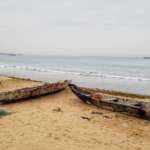A Closer Look at Benin
Benin Flag

Benin Formation Date
Benin's country formation date is August 1, 1960.
Benin Capital Name
Porto-Novo
Benin Neighbours
Exploring Benin
Introduction
Benin, officially known as the Republic of Benin, is a West African country located between Togo and Nigeria. It covers an area of 112,622 square kilometers and has a population of over 12 million people. Formerly known as Dahomey, the country gained its independence from France in 1960 and changed its name to Benin in 1975. The name "Benin" is derived from the Bight of Benin, a large bay on the country's coastline. With a rich history, diverse culture, and beautiful landscapes, Benin is a hidden gem waiting to be explored.Key Takeaways
- Benin is a West African country with a population of over 12 million people.
- The country gained its independence from France in 1960.
- The name "Benin" is derived from the Bight of Benin, a large bay on the country's coastline.
- Benin has a rich history, diverse culture, and beautiful landscapes.
Geography
Benin is a small country with a varied landscape. The southern part of the country is characterized by coastal plains, while the northern region is dominated by plateaus and hills. The highest point in Benin is Mont Sokbaro at 658 meters. The country also has several rivers, including the Niger River, which forms part of its northern border. Benin is rich in natural resources such as oil, natural gas, gold, and limestone. Agriculture is also an important sector in the country, with crops such as cotton, cocoa, and palm oil being major exports. The climate in Benin is tropical with two distinct seasons - a wet season from April to October and a dry season from November to March. The country experiences high temperatures and humidity throughout the year, with average temperatures ranging from 25°C to 35°C.Origin and History
Benin has a long and fascinating history, with evidence of human settlement dating back to 10,000 BC. The country was home to several ancient civilizations, including the Kingdom of Dahomey, which ruled from the 17th to the 19th century. In the late 19th century, Benin was colonized by France and became part of French West Africa. In 1960, Benin gained its independence from France and became a republic. Since then, the country has experienced periods of political instability, including a communist regime in the 1970s and a transition to democracy in the 1990s. Today, Benin is a stable democracy with regular elections and a growing economy.Government and Politics
Benin is a presidential republic with a multi-party political system. The President is both the head of state and government and is elected for a five-year term. The country is divided into twelve departments, each with its own elected council. Benin maintains good relations with its neighboring countries and is a member of several international organizations such as the United Nations and the African Union. The country also has close ties with France, its former colonial power.Commerce and Economy
Agriculture is the mainstay of Benin's economy, accounting for about one-third of its GDP. Other important sectors include services, industry, and trade. The country's main trading partners are Nigeria, China, India, and France. The official currency of Benin is the West African CFA franc (XOF), which is pegged to the Euro. The country has seen steady economic growth in recent years, but poverty remains a significant issue for many of its citizens.Demographics
Benin has a diverse population with over 50 ethnic groups. The largest ethnic group is the Fon, followed by the Yoruba, Adja, and Bariba. French is the official language, but many other indigenous languages are also spoken. The majority of the population in Benin is young, with a median age of 18 years. Life expectancy is around 60 years, and the literacy rate is approximately 40%.Culture
Benin has a vibrant and diverse culture, influenced by its rich history and ethnic diversity. Traditional art and music play a significant role in the country's culture, with intricate woodcarvings and colorful fabrics being popular forms of expression. Traditional festivals and ceremonies are also an essential part of Beninese culture, celebrating harvests, births, and other significant events. Some popular festivals in Benin include the Voodoo Festival, which celebrates the country's indigenous religion, and the Gelede Festival, which honors women and their contributions to society.Languages and Religion
French is the official language of Benin, but several indigenous languages are also spoken. These include Fon, Yoruba, Bariba, and Dendi. The dominant religion in Benin is Christianity, followed by Islam and traditional indigenous beliefs. Voodoo, a traditional religion practiced in Benin, is recognized as an official religion and has a significant influence on the country's culture.Education and Healthcare Systems
Education in Benin is free and compulsory for children between the ages of six and sixteen. However, access to education remains a challenge for many due to poverty and other socio-economic factors. The country has made significant progress in recent years in improving literacy rates. Benin's healthcare system is still developing, with limited resources and access to medical care in rural areas. The government has implemented various initiatives to improve public health, including vaccination programs and campaigns to combat diseases such as malaria and HIV/AIDS.Sports and Recreation
Football (soccer) is the most popular sport in Benin, with the national team, known as the Squirrels, achieving some success in regional tournaments. Other popular sports include basketball, handball, and traditional wrestling. In addition to sports, Benin offers a range of recreational activities for visitors, such as hiking in the lush forests of the Pendjari National Park or relaxing on the beautiful beaches of Ouidah.Tourism
Benin may not be a well-known tourist destination, but it has a lot to offer visitors. The country has a rich cultural heritage, with many historical sites and museums showcasing its past. Some must-see attractions include the Royal Palaces of Abomey, a UNESCO World Heritage Site, and the Temple of Pythons in Ouidah. Nature lovers will also enjoy exploring Benin's diverse landscapes, from the W National Park in the north to the stunning waterfalls at Tanougou in the east. The country also has a growing eco-tourism industry, offering visitors the opportunity to experience traditional village life and participate in conservation efforts.Travel Information for Foreign Visitors
Foreign visitors to Benin must have a valid passport and visa. Visas can be obtained from embassies or consulates of Benin in their home country. The official currency is the West African CFA franc, but US dollars are also widely accepted. Credit cards are not commonly used, so it is advisable to carry cash when traveling. Health and safety should also be taken into consideration when visiting Benin. It is recommended to get vaccinated for yellow fever and take precautions against malaria. Visitors should also be aware of their surroundings and avoid traveling alone at night.Quotes
- "Africa is not a country, it's a continent. And it's a big one too." - Boniface Mwangi
- "I am an African, not because I was born in Africa but because Africa is born in me." - Kwame Nkrumah
- "You can't build a reputation on what you are going to do." - Henry Ford
Conclusion
In conclusion, Benin is a small but culturally rich country with a fascinating history and diverse landscape. With its stable democracy and growing economy, the future looks bright for this West African nation. From its vibrant culture to its beautiful natural attractions, Benin has something to offer every visitor. So, if you're looking for an off-the-beaten-path destination, consider adding Benin to your travel bucket list.Benin Image Gallery
Benin Highest Point Name
The highest point in Benin is Mont Sokbaro, located near the border with Togo. The peak has an elevation of 658 meters (2,159 feet) above sea level.
Benin Highest Point Value
658 m
Benin Capital Longitude
6.4969° N
Benin Capital Latitude
2.6289° E
Benin Official Languages
French
Benin Ethnic Groups
39.2% Fon
17.6% Yoruba
9.2% Bariba
8.2% Aja & Mina
6.9% Fula
12.1% Ottamari
4.0% Yoa-Lokpa
2.5% Dendi
0.4% other
Benin Religions
Christianity (48.5%)
Islam (27.7%)
Others / None (12.2%)
Vodun (11.6%)
Benin Total Area
112,622km2
Benin Land Area
110,622 km2
Benin Water Area
2,000 km2
Benin Total Population
11,000,000
Benin Currency Name
West African CFA Franc
Benin Currency Code
XOF
Benin Time Zones
- UTC+01:00
Benin is in the West Africa Time Zone, which is UTC+1. Daylight Saving Time, when clocks are shifted forward by 1 hour, is not observed in Benin.
Benin Calling Code
+229
Benin Internet TLD
www.aveholidays.bj
How to Say "Benin" In Different Languages?
- Indonesian
- Benin (id-ID)
- Chinese
- 贝宁 (zh-CN)
- Arabic
- بنين (ar-EG)
- French
- Bénin (fr-FR)
- German
- Benin (de-DE)
- Hindi
- बेनिन (hi-IN)
- Italian
- Benin (it-IT)
- Japanese
- ベナン (ja-JP)
- Korean
- 베냉 (ko-KR)
- Yoruba
- Orílẹ́ède Bèní (yo-NG)
- Polish
- Benin (pl-PL)
- Portuguese
- Benin (pt-PT)
- Russian
- Бенин (ru-RU)
- Afrikaans
- Benin (af-ZA)
- Spanish
- Benín (es-ES)
- Thai
- เบนิน (th-TH)
- Turkish
- Benin (tr-TR)
- Ukrainian
- Бенін (uk-UA)
- English
- Benin (en-US)
- Vietnamese
- Bê-nan (vi-VN)
Benin Popular Holidays
- New Year’s Day
- 1 January
- Republic Day
- 1 March
- Good Friday
- 10 April
- Easter Sunday
- 12 April
- Worker’s Day
- 1 May
- Ascension Day
- 14 May
- Pentecost
- 31 May
- La Fete Nationale
- 29 July
- Benin Independence Day
- 1 August
- End of Ramadan
- 14 August
- National Assumption Day
- 15 August
- Aïd El Kebir
- 21 August
- Aïd El Fitr
- 24 August
- Feast of the Nativity
- 25 September
- All Saints Day
- 1 November
- All Souls Day
- 2 November
- Christmas Day
- 25 December






